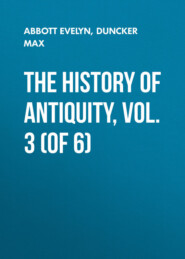По всем вопросам обращайтесь на: info@litportal.ru
(©) 2003-2024.
✖
The History of Antiquity, Vol. 6 (of 6)
Настройки чтения
Размер шрифта
Высота строк
Поля
Strabo, p. 591.
279
Herod. 5, 11.
280
Herod. 4, 143, 144.
281
Herod. 5, 12.
282
Herod. 5, 26, 27.
283
Herod. 5, 12, 23, 25. The chronology which Herodotus thus gives to the campaign of Otanes, representing it as subsequent to that of Megabyzus, is impossible. He himself represents Otanes as nominated general of the forces on sea, and only subsequently as a successor of Megabyzus. The subjugation of the cities belongs to his first command.
284
Herod. 6, 40, 84.
285
It is self-evident that Miltiades did not wait for the arrival of Darius on the Danube.
286
According to Polyaenus, Chalcedon was taken by a mine, which was carried from a hill 15 stades from the city under the market-place. "Strateg." 7, 2, 5. It is obvious that we must read Καλχηδών here, and not Καρχηδών. The altar of Zeus Diabaterius which, according to Ctesias, Darius erects, and the Chalcedonians subsequently pull down, is certainly identical with the two monuments which, according to Herodotus, Darius set up at Byzantium (above, p. 269). Herodotus also speaks of the destruction of the monuments, but ascribes it to the Byzantines. This was done obviously in the time after the battle of Mycale; if previously destroyed they would have been restored by Megabyzus and Otanes when they subjugated the Hellespont. Of the later destruction Herodotus relates that the Byzantines conveyed the stones into the city, and used them in building the altar of Artemis Orthosia; one stone only, covered with Assyrian letters, was left at the temple of Dionysus: Herod. 4, 87.
287
De Rougé, "Revue Archéolog." 8, 51, 52. De Rougé has Aram, Brugsch now reads Elam ("Hist. of Egypt," 2, 297), and translates: "For he also was the great lord of all lands and a great king of Egypt, – in order that I might reinstate the number of the sacred scribes of the temples, and revive whatever had fallen into ruin. The foreigners escorted me from land to land, and brought me safe to Egypt, according to the command of the lord of the land. I did according to what he had commanded. I chose them from all their (?) of the sons of the inhabitants – to the great sorrow of those who were childless – and I placed them under expert masters, the skilful in all kinds of learning, that they might perform all their works. The king did all this – in order to uphold the name of all the gods, their temples, their revenues, and the ordinances of their feasts for ever."
288
Herod. 2, 110; Diod. 1, 50, 95. For Rach-num-hat which he read previously Brugsch now reads Chnum-ab-rha. "Hist. of Egypt," 2, 299.
289
Mariette, "Athen. Franç." 1855; Mai, p. 48.
290
The remark in Polyaenus; Darius marching through Arabia against the Egyptians who rebelled against the tyranny of Aryandes, had again gained their affection by offering a prize of 100 talents of gold to the discoverer of a new Apis in the place of that which had just died, cannot be referred to the Apis which died in the year 518 B.C. In that year Darius was fighting in Media against Phraortes, Aryandes was satrap in the year 512 B.C. and long after. Hence it must refer to the second Apis, which appeared in 491 B.C., the thirty-first year of Darius, for which Darius caused a sepulchre to be built. That the first rebellion of the Egyptians against Darius took place about this time follows from a chapter in Aristotle's "Rhetoric," 2, 20, where we are told that Darius did not cross over to Hellas before he had reduced Egypt; and in like manner Xerxes reduced Egypt before crossing over to Hellas. The "crossing over" can only refer to the campaign of Datis and Artaphernes; the first rebellion of Egypt against Darius therefore took place just when the rebellion of the Ionians had been crushed, i. e. 492, 491 B.C.; the second occurred in 486 B.C.
291
Herod. 4, 145 says, "at the same time when Megabyzus subjugated the inhabitants of the Hellespont." This subjugation would begin in the autumn and pass over into the next spring.
292
Herod. 4, 167. Above, p. 152.
293
Herod. 4, 164, 200.
294
Herod. 4, 165, 167, 197.
295
Herod. 4, 200-204; Heracl. Pont. fragm. 4, ed. Müller.
296
Herod. 4, 203, 204.
297
Herod. 4, 163; Heracl. Pont. Fragm. 8, ed. Müller; Pindar, "Pyth." 4, 5 and the Scholia.
298
Herod. 3, 91.
299
Herod. 7, 71.
300
In Brugsch, "Hist. of Egypt," 2, 297, Settu-Ra.
301
Lepsius, "Inschriften von Charigeh und Dachileh, Z. f. Aeg. Spr." 1874, s. 75, 78.
302
It seems to me rash to find Carthage in Karka (so also in the Babylonian version) with Oppert ("Journal Asiatique," 1872, p. 163 ff.), and Mordtmann ("Z. D. M. G." 16, 110).
303










